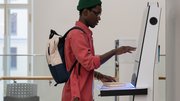News
Kiosks help keep tabs on the accused
July 6, 2003
OCEOLA COUNTY, Fla. -- In an effort to save money and jail space, Osceola County Jail has been using a kiosk to keep track of people out on bail and awaiting trial, according to a story in the Orlando Sentinel.
Instead of talking to someone in person every time, clients use a personal identification number and a fingerprint to check in on the kiosk. They answer computerized questions, in Spanish or English, such as whether they have moved or changed jobs since their last session, the story said.
"Sometimes the machine doesn't work," said Fausto Gonzalez, who was arrested in May on a charge of aggravated battery, and who uses the kiosks to check in. "It's not convenient because if anything goes wrong they [police] can pick you up."
Tom Jones, president of AutoMon Corp., which provides the machine to Osceola, agreed the machine has been balky over the past 18 months. If the county renews its contract, AutoMon plans to upgrade the six-year-old machine and switch from fingerprints to hand-geometry biometric identification, Jones said in the article.
The kiosk, which is available 24 hours a day, saves time and money, results in more defendants showing up for court and frees workers to monitor extremely violent offenders who need closer supervision, Jones said. The machine even can accept payments, such the $10 fee paid by those under supervision. More than 300 people are signed up, but indigents are not charged, Jones said.
Osceola is the only AutoMon kiosk location in Florida, Jones said, but the company has machines in 16 states, including New York, California and Washington. The state probation department in Seminole County was part of a pilot program in 1996 to launch the kiosks, but it no longer uses them, said Joe Hatem, a regional director for the state Department of Corrections.
Phillip Stalvey, community services director for Seminole, said that while the county doesn't use the kiosks, he is familiar with them. They're best for supervising people who pose little risk to the community, he said. Osceola criteria permit only Florida residents accused of violating local ordinances or traffic laws and those accused of lesser felonies to use the kiosks, the story said.










